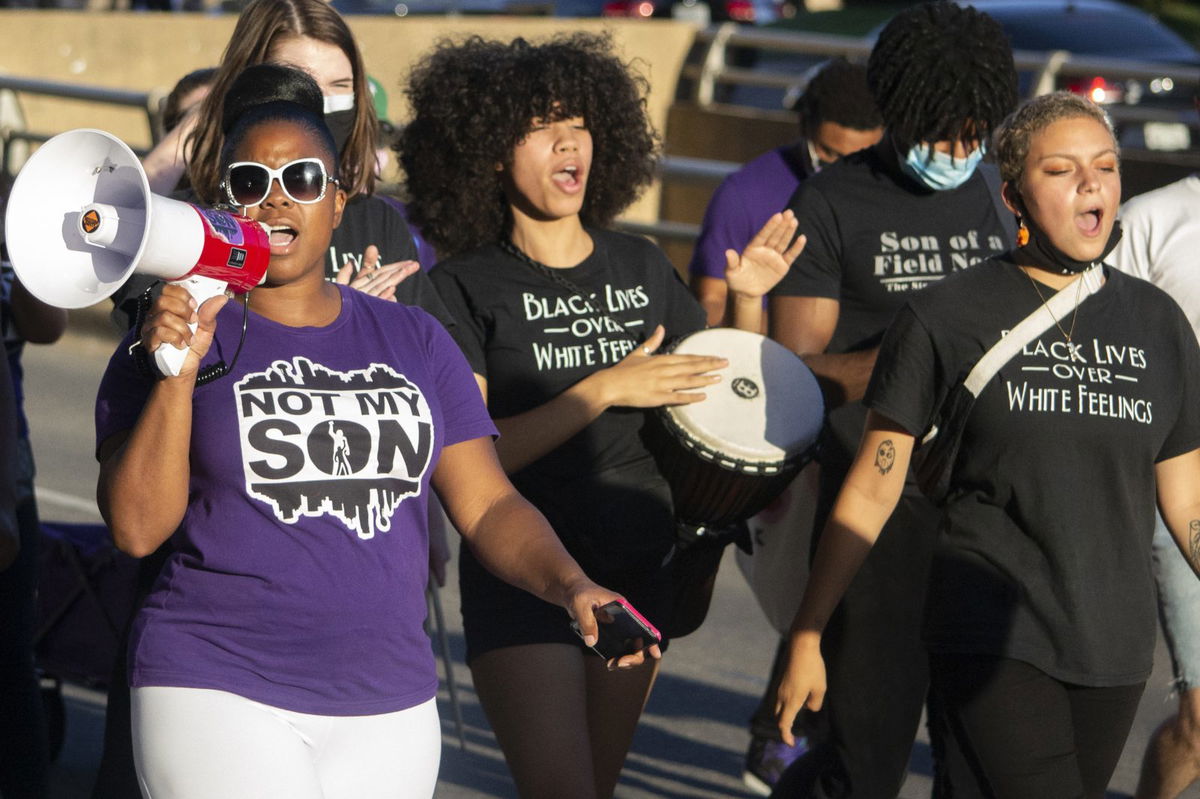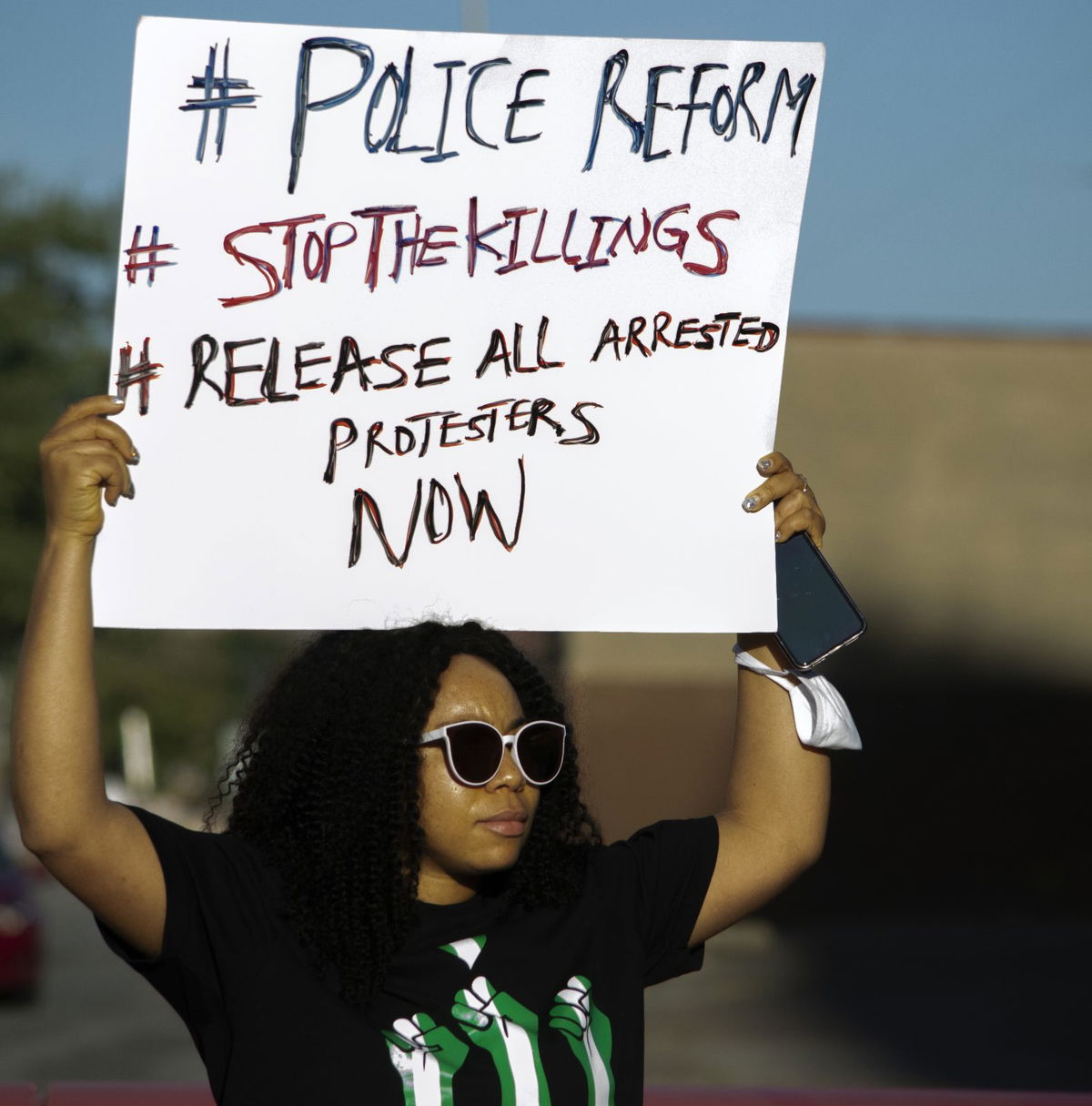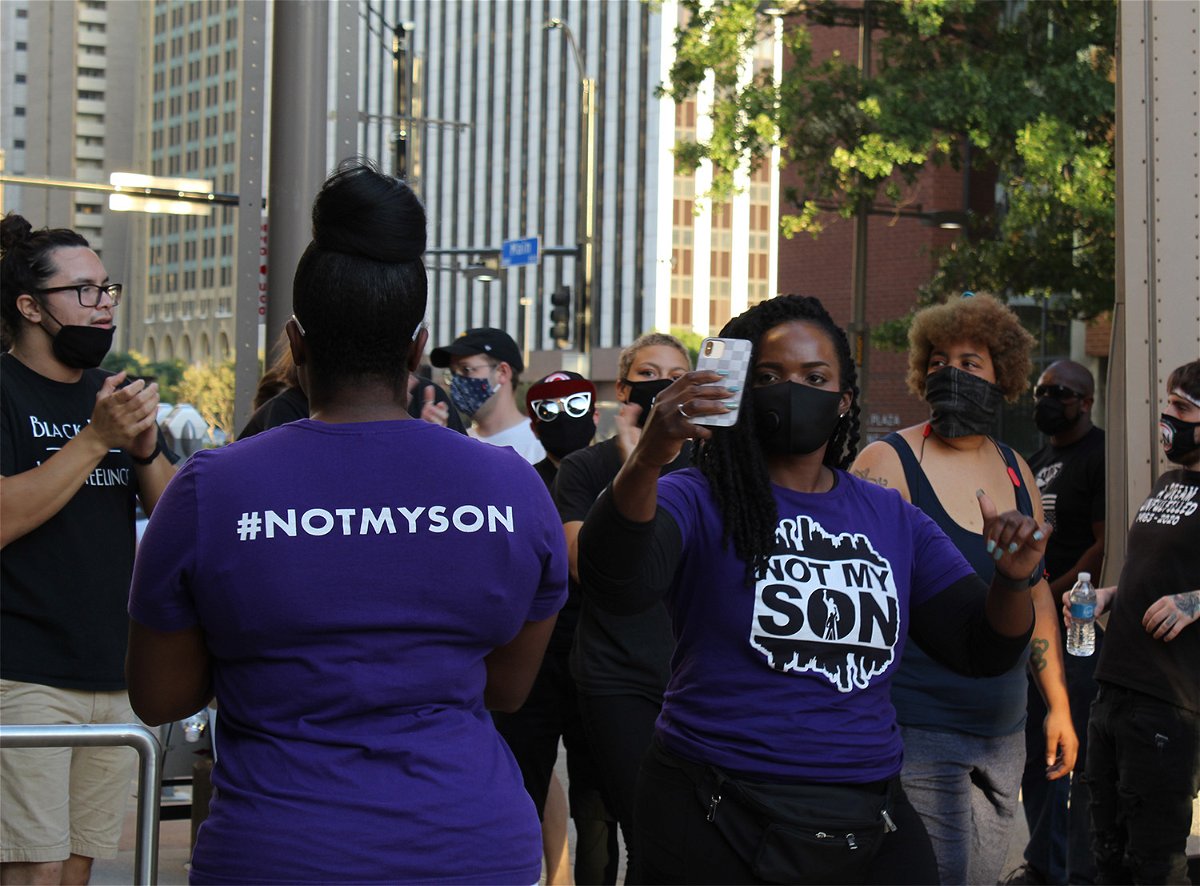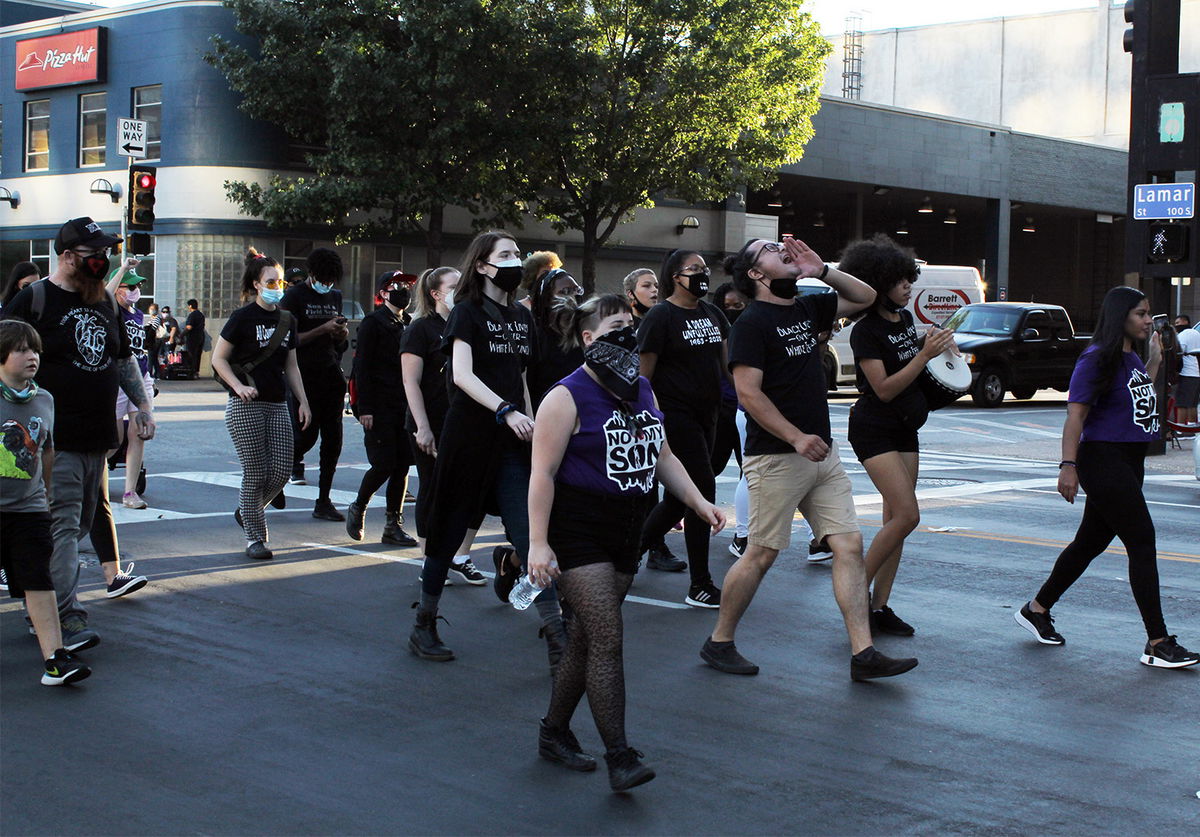Four days into the Dallas protests against police brutality, a large crowd gathered on the steps of the Frank Crowley courthouse — just beyond the area where police were enforcing a city-instituted 7 p.m. curfew.
It was June 1, and hundreds of protesters continued to take part in a nationwide movement demanding justice for the killing of George Floyd by Minneapolis police. The masked crowd began to move, marching onto the Margaret Hunt Hill Bridge.
Police began barricading both sides of the towering white arch, trapping protesters in the middle and blocking them from escaping.
Officers ordered protesters to get on the ground and began throwing smoke bombs and tear gas that blended their flashing red and blue lights into purple fumes. The air was filled with smoke screens and screams.
More than 600 protesters, lying face down on the concrete, had their hands zip-tied behind their backs. A few even jumped over the side of the bridge in an attempt to get away from the arresting officers and flying projectiles.
But not Tramonica Brown.

The 28-year-old stepped over the handcuffed bodies and made her way to an officer.
“I was just like, ‘I need to get down there and talk to whoever is in charge,’ because it was very kid-friendly,” Brown says. “Several kids, young preteens and teens were out there, and they were being handcuffed and told to lay on the ground. I took issue with that being that I come from an educator’s background. That struck a real nerve — on top of nobody did anything wrong.”
The officer agreed to let her go after she expressed her concern for the children being arrested. With her freedom, Brown immediately walked more than 2 miles to the police station to confront Chief Reneé Hall and other city officials until Hall finally released the adolescents.
Other protesters were held up on the bridge for more than four hours, while officers used shuttle buses to drop them off near the courthouse and demand they leave the area. Due to overcrowding in jails, none were taken into custody that night.
The next day, Brown created Not My Son.
Protesting is personal for this mother and educator
Brown’s idea behind Not My Son was to unite the community and reform oppressive policies through three pillars: social activism, community outreach and civic engagement. The nonprofit tries to host at least three events every month. In October, for example, their events included a march to the polls, a rally for Black women and a community clean-up day in South Dallas.
“Phew! It is a lot,” Brown says. “I think it’s important to keep the narrative of the protesting going strong, so that’s where our social activism comes from. But when we’re able to get into, feed and truly engage in those communities and not just say, ‘Oh you know, we’re just strolling down the street in the community, let’s take a picture,’ — like actually formulate bonds within those communities, it lets them know that they have people out here who care.”
Brown’s role as both a teacher and a mother shaped the birth of Not My Son. The verdict in the case of Trayvon Martin is what initially set ablaze Brown’s passion for wanting to create change because she was a mother of a 2-year-old boy at the time. She began to educate herself and understand how community politics and policing are supposed to function in a democratic society.
In the wake of the George Floyd protests, Brown finally began to put her education into action.
“That was just what I like to call the straw that broke America’s back,” she says.

She quit teaching to dedicate all her time and energy to Not My Son. Part of the nonprofit’s community outreach pillar is to provide tutoring, which also provides an outlet for Brown to continue teaching.
“Teachers basically helped build Not My Son,” Brown says. “It was almost like a little, small coalition of teachers who kind of got together and really planned it out to get the logistics of it started.”
Community outreach manager Christina Scott, 27, is studying to become a future educator in the Dallas Independent School District. Like Brown, she understands that Not My Son and youth involvement go hand-in-hand.
“Kids are our future, and they’re looking up to us so they can navigate and go through this with us,” Scott says.
In September, Not My Son led a “Kids and Pups Protest” to encourage the involvement of more children. Over 25 kids showed up outside City Hall dressed in their purple Not My Son shirts. Parents marched hand-in-hand with their children and dogs down the streets of Dallas.
Some children held cardboard signs depicting variations of “Black Lives Matter.” One little girl took hold of the megaphone and began chanting, “No justice, no peace!”
Brown says her background in education helps her to see the movement from their eyes, “because you’ve been able to have those conversations that they wouldn’t have with their parents, so I know how they feel about George Floyd,” Brown says. “I know how they feel about Trayvon Martin. I know how they feel about Atatiana Jefferson. Being able to engage with those students and to see the fear in them, as both a mother and a teacher, it is my job to protect them as best I can.”
Protecting the vulnerable — including the protestors
Brown’s dedication to protecting others is part of why Not My Son has garnered so much attention from Dallas residents in just six months.
“She is always looking out for Black women, Black men and Black kids,” Scott says. “So to have a founder that is putting Black lives first no matter what is going on, I know that she will be there for Black lives at the drop of a dime.”
Not My Son volunteer Katrina Washington, 40, says that working with Brown and her organization is an “out-of-body experience.” She says it wasn’t until Not My Son that she found where she truly belongs.
“Right now she’s just unmatched with the things she’s done for her community,” Washington says of Brown. “You see a lot of people come out and do certain things but not everybody’s doing it from the heart, and that’s the difference with Tramonica. She cares about her community, she cares about the things that are transpiring — she really cares, so that’s the difference that I see with her versus other organizations. I don’t think it’s the heart, always.”

Despite Brown’s leadership and her dedicated team, Not My Son still encounters roadblocks — besides the literal police barricades.
“Of course we get the traditional I-hate-your-life types of emails, but at this point, I don’t know what group doesn’t,” Brown says. “I feel like sometimes we should receive resources and we don’t, and I’ve come to terms with that.
“At the end of the day, we have to do what’s going to work for us and make sure we can go home and sleep at night, with the community knowing that we’re actually out here working for them and not to look good and use them.”
Her line of work comes with risks and potential dangers. This year, protesters nationwide have been run-over, beat, shot and much more.
After protests in Dallas became more violent, Brown’s husband, Yaheim Israel, founded Watchmen, Not My Son’s brother organization. Central Track, a Dallas news and media website, described Watchmen as an “an open-carry Black gun association.”
The Watchmen seek to protect protesters and various organizations throughout the DFW area and beyond. They were born out of “policing the police,” Brown says.
“A lot of people think that they’re like a militia group that comes with guns ready, blazing at all points in time, and that’s not true,” Scott says. “They’re just big brothers. They come out and make sure nothing is happening with their sister organizations, and when I say sister organizations, it’s not just Not My Son. It’s any organization.”
Despite the overwhelming sense of family and community created by Brown and Not My Son, the reality, they say, is that every day poses a risk for protesters, just like it does for Black lives.
“I think a lot of people look at us and think, ‘Aw this is fun,’ ” Washington says. “No, it’s not fun.”
‘That was a dark day’
Protesters had marched for 118 days after Breonna Taylor’s death until a case decision was made on Sept. 23, which is why Brown said that “it felt like a huge slap in the face” when it was decided not to charge any officers for her death.
“That was a dark day,” Brown says.
At 7 p.m. that night, protesters marched together in anger under the lights of the downtown Dallas skyline. Ditching their normal purple shirts, Not My Son was clad in all black, standing in solidarity with all other organizations and protesters across the DFW metroplex.
The sound of helicopters permeated the tense air. Anger and pain poured out of Brown’s heart as she chanted with the crowd, “Say her name, Breonna Taylor.”
“As a Black person, you really felt it because you’re thinking, ‘This could’ve been my daughter, this could’ve been my mom, this could’ve been my sister — it could’ve been me,” Washington says.
Brown and her team were distraught but not discouraged.
“I would love nothing more for real justice to be served,” Brown says. “We’re going to continue to march and fight until we see justice. We’re going to keep those names on the brains of the people and not let them forget these people. It’s too many.”
It’s the “too many” that overflowed the Black Lives Matter movement with support this year. Washington believes if it weren’t for George Floyd, the movement wouldn’t be as big as it is now.
“It just kind of opened back up a wound that had been stitched together,” Washington says. “I think people are more involved now because it’s something they saw with their own eyes.”
Not My Son volunteer Kayla Miles, 42 and white, says Floyd’s death was an awakening for her and “for white America.”
“I thought Black Lives Matter was just a Black thing before George Floyd, and after, I realized there’s a lot more to it,” Miles says. “We all have to be in it together and fight the fight.”

While Scott is glad to see a surge of people standing up for Black lives, “it’s very unfortunate that we do have to be in the streets in 2020 just screaming for equal rights among Black and brown lives,” she says.
The reason Not My Son has gained so much momentum for the movement in Dallas, Scott says, is because their fight for justice is focused on every level of the community.
“We are what sets the standard for how our community should be run,” Scott says. “We obviously know that our governing bodies aren’t there to help and service our community, so we have to be the backbone of our community to help them out.”
No one expected a 28-year-old teacher and young mother of two to lead Dallas in the movement for Black Lives Matter, not even Brown. But despite setbacks, she keeps fighting for the people. They are what motivate her to keep going.
“That’s going to forever be my answer,” Brown says. “The people.”
This story was co-published by our media partner, the Dallas Weekly.

Leave a Reply